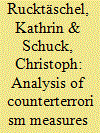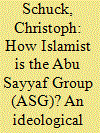| Srl | Item |
| 1 |
ID:
175065


|
|
|
|
|
| Summary/Abstract |
This article analyzes counterterrorism (CT) measures that have been developed and implemented since the 2002 Bali attacks, paying special attention to the presidencies of Yudhoyono and Widodo. On the basis of anti-terrorism concepts, current findings of anti-terrorism research will be applied to the case of Indonesia, whereby we will distinguish between reactive and preventive measures and will show how they interact. Here, the revision of existing anti-terror laws carried out by the Indonesian Parliament in May 2018 will receive particular attention. As will be documented, in spite of the initially quite promising short-term effects of CT measures, the already strained relationship between the police and the military regarding jurisdiction has become even more critical in recent years. Since only a few religious or civil authorities have been included to a large extent in attempts to prevent terrorism, these measures are not likely to be as effective and lasting as they might have been.
|
|
|
|
|
|
|
|
|
|
|
|
|
|
|
|
| 2 |
ID:
179305


|
|
|
|
|
| Summary/Abstract |
This article demonstrates that militant groups who base their actions on Islam do so for two reasons: Either they do in fact pursue Islamist objectives, or the groups use what appears to be an Islamist narrative in order to pursue goals which actually have no religious basis. In the first part, conceptual issues are discussed to differentiate these motivations and examining how they are implemented beyond rhetoric. In the second part, the conceptual findings are applied to the Philippine Abu Sayyaf (ASG), since there is no agreement in academic debate on the group’s classification. It is demonstrated that the ASG had intrinsically Islamist features that continuously changed into a more instrumentalizing Islamist behavior. Despite the high fragmentation of the group today, it is argued that the ASG is a largely non-Islamist group which knows how to use an Islamist narrative to portray itself in ways that give it an advantage.
|
|
|
|
|
|
|
|
|
|
|
|
|
|
|
|